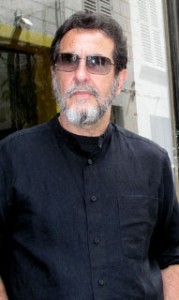 Rosalind Palermo Stevenson is the author of the novella “Insect Dreams” published by Rain Mountain Press. “Insect Dreams” has also been published in the anthologies: Poe’s Children (Random House/Doubleday, edited by Peter Straub); and, Trampoline (Small Beer Press, edited by Kelly Link). Her short fiction has been anthologized in Wild Dreams: The Best of Italian Americana (Fordham University Press), and has appeared in literary journals including: Web Conjunctions, Drunken Boat, First Intensity, Spinning Jenny, Skidrow Penthouse, Italian Americana, River City, Quick Fiction, Washington Square, No Roses Review, and others. Dramatic readings of her story “The Guest” have been presented for Share Our Strength and at the Italian American Writers Association (IAWA). The Guest was also the winner of the IAWA annual fiction prize and named story of the year by the cultural journal Italian Americana. Her work has received several Pushcart nominations, and her short story Kafka at Rudolf Steiner’s is forthcoming as a chapbook from Rain Mountain Press. Rosalind lives in New York City where she is currently finishing a novel.
Rosalind Palermo Stevenson is the author of the novella “Insect Dreams” published by Rain Mountain Press. “Insect Dreams” has also been published in the anthologies: Poe’s Children (Random House/Doubleday, edited by Peter Straub); and, Trampoline (Small Beer Press, edited by Kelly Link). Her short fiction has been anthologized in Wild Dreams: The Best of Italian Americana (Fordham University Press), and has appeared in literary journals including: Web Conjunctions, Drunken Boat, First Intensity, Spinning Jenny, Skidrow Penthouse, Italian Americana, River City, Quick Fiction, Washington Square, No Roses Review, and others. Dramatic readings of her story “The Guest” have been presented for Share Our Strength and at the Italian American Writers Association (IAWA). The Guest was also the winner of the IAWA annual fiction prize and named story of the year by the cultural journal Italian Americana. Her work has received several Pushcart nominations, and her short story Kafka at Rudolf Steiner’s is forthcoming as a chapbook from Rain Mountain Press. Rosalind lives in New York City where she is currently finishing a novel.
Rosalind, I really enjoyed reading about the land and people you describe in this excerpt from The Absent. Westward expansion and the idea of manifest destiny made for an exciting period in American history, one of discovery and promise, but also challenge and tribulation, depravity and brutality. What sparked your interest and made you choose to write about this period?
For me a work begins more with an impulse than an idea. An originating impetus. It’s more in the body than in the mind. The thing that sparks the work for me is not really and idea or anything intellectualized. For “the Absent” the spark was a voice and a rhythm, and then a particular sentence that had come into my mind–though that sentence did not make it in the final draft. In any case the sentence was: Here is the way it was when I was taken, the murder of my father on the lower Red River. The voice, the rhythm, and that sentence became for me something that Bruno Schulz would call the ‘…ultimate raw material… the atmosphere, indicating a specific kind of content that grows out of it and is layered upon it.’
Of course this raw material of necessity must come from and be comprised of ‘something.’ For me that ‘something’ grew out of a combination of things that had been on my mind at the time, or that had impressed me or moved me in different ways. For example I had recently gone to an exhibit called “Spirit Capture” at the Smithsonian’s National Museum of the American Indian, and a certain creative impulse was sparked by seeing it. I’ve always been drawn to the spiritual path of the Native Americans, particularly the Navajo and their view of life as effort toward achieving an inner state that is in alignment with the greater state of being of the cosmos. Around the time I began the book I had also stumbled on a very brief account of a young boy who had been abducted by Indians, who were shortly afterwards forced by the army to return him to his mother. And I had been excited by Michael Ondaatje’s “The Collected Works of Billy the Kid” and Cormac McCarthy’s “Blood Meridian,” and the treatment they had each given to subject matter similar to that which had been bubbling up in me.





